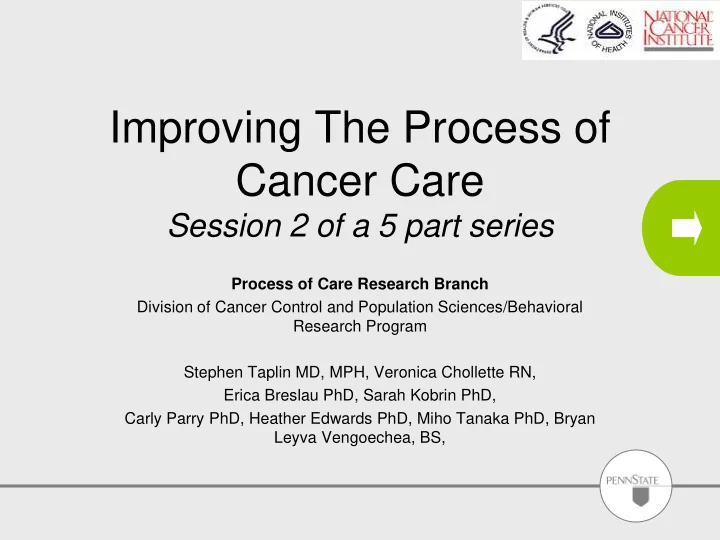

Improving The Process of Cancer Care Session 2 of a 5 part series Process of Care Research Branch Division of Cancer Control and Population Sciences/Behavioral Research Program Stephen Taplin MD, MPH, Veronica Chollette RN, Erica Breslau PhD, Sarah Kobrin PhD, Carly Parry PhD, Heather Edwards PhD, Miho Tanaka PhD, Bryan Leyva Vengoechea, BS,
For Participants •Understand the perspectives of three communities with respect to problems in cancer care delivery •Learn conceptual, analytic, and practical approaches to understanding and addressing problems in cancer care delivery •Contribute to the development of NCI’s research agenda
Series Purpose – for NCI •Solicit opinions from three sectors of the community regarding problems in the quality of cancer care Providers, Researchers, Health Care Purchasers •Identify potential research topics that might address those problems •Focus the research agenda of PCRB upon major underlying factors affecting the processes of cancer care.
Continuing the Discussion July 9, 2014, 2:00 PM - 3:00 PM EST Team Based Measures in Primary Care Dr. Richard Ricciardi November 5, 2014, 2:00 PM - 3:00 PM EST Research Priorities in Cancer Care Teams Research Dr. Eduardo Salas July 1, 2015, 2:00 PM - 3:00 PM EST Team Cognition: Understanding the Factors That Drive Process and Performance Dr. Steve Fiore To register, go to: http://dccps.nci.nih.gov/brp/pcrb/cyberseminars.html If you have questions, contact Veronica Chollette (cholletv@mail.nih.gov)
Review Case Study 57 yo slighty obese female with a history of hypertension Arrives early – checked in late -Focus of visit is hypertension Nurse notes need for mammogram on check out – orders Abnormal screen reported and MD calls patient to leave message Pt must schedule follow-up evaluation Follow-up done and Radiologist recommends bx Rad tells patient to schedule with 1 0 MD Rad Notifies 1 0 MD Bx performed between business trips and 6 wks after abnormality Results given in person by surgeon Patient devastated Surgeon busy and recommends scheduling with .. Oncologist Radiation therapist Patient overwhelmed - but goes home with phone numbers
Microdynamics of Teamwork Stephen Humphrey Penn State University
Overview Discuss teamwork and rewards Apply to the case discussion Discuss challenges for teams in health care Discuss directions for application and future research
What is a team? Traditional definition versus current boundary-less configurations Assemblies of interdependent relations and activities organizing shifting sets or subsets of participants embedded in and relevant to wider resource and institutional environments
Teams … Do I know I’m in a team? How many teams am I in? Who’s the point person / leader / quarterback? Am I rewarded for it?
Teams vs. groups of independent players Series of teams (MTS), pass information Miscommunication between players How much do players communicate with each other? Is there incentive to do so? What are the goals??
Incentives Team care built into ACA Metrics / Incentives to work together What are implications of rewards on team member behaviors? Quality versus quantity? Collaboration? Relationship building?
Suggestions for Future Research and Application Identification / labeling of team People need to know they are in a team, who else is in the team, what the team’s goals are Consideration of team rewards Which behaviors do we want to reward? Bring the patient into the equation
Recommend
More recommend